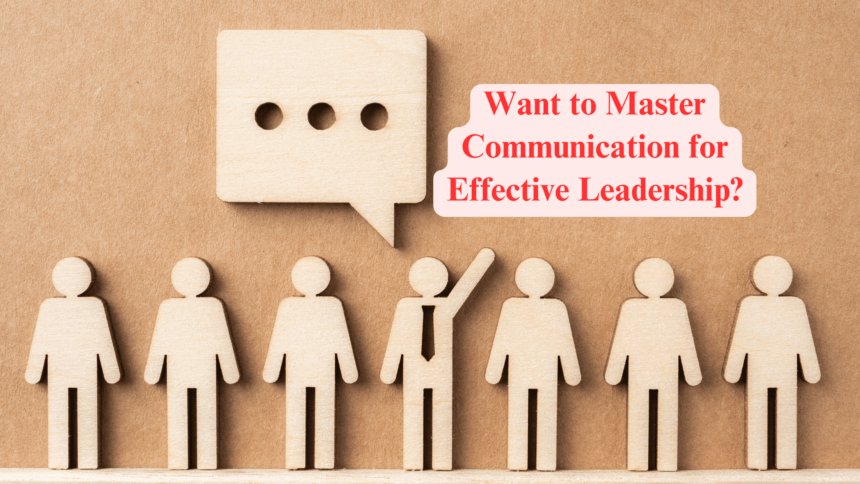Introduction
Effective communication is the cornerstone of successful leadership. Leaders who master the art of communication can inspire, influence, and drive their teams toward achieving common goals. This article explores essential communication skills that every leader must develop to lead effectively.
The Foundation of Communication

At its core, communication is the exchange of information between individuals. It involves not just the words spoken but also the tone, body language, and context. Effective communication ensures that the message is not only conveyed but also understood and acted upon. The fundamental elements include the sender, the message, the medium, the receiver, and feedback.
The Art of Active Listening

Active listening is more than just hearing words; it involves understanding the underlying emotions and intentions. Leaders who listen actively can build stronger relationships with their teams. Techniques to enhance active listening include maintaining eye contact, nodding to show understanding, and asking clarifying questions.
Communicating with Clarity
Clear communication prevents misunderstandings and ensures that everyone is on the same page. Leaders must articulate their thoughts in a straightforward manner. Methods to achieve clarity include organizing thoughts before speaking, using simple language, and avoiding jargon.
The Role of Conciseness
Being concise is about delivering the message without unnecessary details. It saves time and avoids confusion. Tips for eliminating unnecessary details include focusing on the main points, using bullet points, and being mindful of the audience’s time.
Developing Emotional Intelligence
Emotional intelligence (EI) is the ability to understand and manage one’s own emotions and the emotions of others. In communication, high EI helps leaders navigate complex interpersonal dynamics. Steps to enhance EI include self-awareness, self-regulation, empathy, and social skills.
Mastering Non-Verbal Communication
Non-verbal cues, such as body language, facial expressions, and gestures, play a crucial role in communication. Leaders must be aware of their own non-verbal signals and be able to read those of others. Effective use of non-verbal communication can reinforce the spoken message and convey confidence.
Empathy in Leadership Communication
Empathy involves understanding and sharing the feelings of others. It’s a critical component of effective leadership communication. Strategies for demonstrating empathy include active listening, acknowledging others’ feelings, and showing genuine concern.
Providing Constructive Feedback
Feedback is essential for growth and improvement. Constructive feedback focuses on behavior and outcomes rather than personal attributes. Approaches to delivering constructive criticism include being specific, focusing on solutions, and maintaining a positive tone.
Effective Public Speaking
Public speaking is a vital skill for leaders. It involves delivering messages to larger audiences with confidence and clarity. Techniques to overcome speaking anxiety include thorough preparation, practicing relaxation techniques, and engaging with the audience.
Navigating Digital Communication
In the digital age, leaders must be adept at communicating through various online platforms. Best practices for online communication include maintaining professionalism, being concise, and respecting digital etiquette.
Conflict Resolution through Communication
Effective communication is key to resolving conflicts. Leaders must address issues head-on and facilitate open dialogue. Methods for resolving conflicts effectively include active listening, finding common ground, and being fair and impartial.
Persuasion and Influence
Persuasive communication involves convincing others to understand and accept your point of view. Techniques to influence others include building rapport, presenting compelling evidence, and appealing to emotions.
Building Trust through Communication
Trust is foundational to effective leadership. Leaders can build trust through transparent communication, consistency, and integrity. Ways to foster trust include being honest, keeping promises, and admitting mistakes.
The Power of Storytelling
Storytelling is a powerful tool for leaders. It makes messages memorable and relatable. Elements of a compelling story include a clear structure, emotional connection, and a strong message.
Tailoring Communication Styles
Different people have different communication preferences. Leaders must recognize these differences and adapt their style accordingly. Adapting your style involves being flexible, observing the audience’s reactions, and adjusting the approach as needed.
Handling Difficult Conversations
Difficult conversations are inevitable in leadership. Strategies for managing these dialogues include preparing in advance, staying calm, and focusing on the issue rather than the person. Maintaining composure is crucial to keeping the conversation productive.
Enhancing Team Communication
Effective communication within teams is vital for collaboration and success. Techniques to improve team interaction include regular meetings, open forums for feedback, and fostering an inclusive environment where everyone feels heard.
Leveraging Technology in Communication
Modern leadership heavily relies on technology for communication. Tools such as video conferencing, instant messaging, and collaboration platforms can enhance connectivity and productivity. Leaders must stay updated on technological advancements to communicate effectively.
Continuous Improvement in Communication
Communication skills can always be improved. Ongoing learning is essential for staying effective as a leader. Resources for improving communication skills include workshops, online courses, and seeking feedback from peers and mentors.
Mastering communication is a journey that requires continuous effort and dedication. By developing these essential skills, leaders can enhance their effectiveness, foster stronger relationships, and lead their teams to success.
Follow Humstory for more content.













